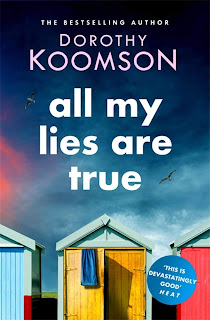
Memories are fragile when you are seventy years old. I can’t afford to lose any more of them, not when remembering the past might help with the here and now.
Nadia needs help. Help getting out of her hospital bed. Help taking her pills. One thing she doesn’t need help with is remembering her sister. But she does need help finding her.
Alone and abandoned in a London hospital, 70-year-old Nadia is facing the rest of her life spent in a care home unless she can contact her sister Simone… who’s been missing for 50 years.
Despite being told she’s ‘confused’ and not quite understanding how wi-fi works, Nadia is determined to find Simone. So with only cryptic postcards and her own jumbled memories to go on, Nadia must race against her own fading faculties and find her sister before she herself is forgotten.
Set against the lush and glamorous backdrop of 20th century Alexandria, Carol Cooper’s third novel is equal parts contemporary mystery and historical fiction: a re-coming of age story about family, identity, and homeland.

My thanks to the publisher who sent my copy for review as part of this Blog Tour .
I don't think I've ever read a novel set in Egypt before, I'm not sure how that happened! I've also not read anything by Carol Cooper before, although I'm aware of her from Social Media.
What an absolute treat this novel is! I'm a huge fan of a dual time-line and the author manages this structure quite perfectly throughout the story.
The story opens in the 'now' as we meet elderly Nadia as she lies in her hospital bed. Nadia is concerned about the pain in her head. She believes that she's had a brain biopsy, but is finding it very difficult to get any answers from the clinical staff. The nurses are busy, seemingly uncaring and not interested, the doctors are aloof, and talk over her. Only nurse Deidre seems to have an ounce of compassion for Nadia's plight, and only Deirdre believes her when she speaks about her sister Simone. Nadia hasn't seen Simone for over fifty years but is determined to find her.
We are then taken back to Alexandria, Egypt in 1953. Nadia is just a young girl, living with her parents and older sister Simone. They are surrounded by various relatives; aunts, uncles, a particularly irritating cousin and an assortment of other adults with vague and quite dubious connections to the family.
It's a wonderful way to structure this epic story of family, relationships and the devastating consequences of ineffective leadership on one small country. As Nadia ages, she discovers that not every adult can be trusted, and when her beloved older sister leaves the country, she is distraught and that feeling never leaves her as Simone doesn't return.
Elderly Nadia, on the hospital ward, surrounded by women who seem alien to her, is comforted by the box of postcards she has kept for decades. Postcards sent by Simone, from all over the world with cryptic messages. Nadia' befuddled brain tells her that Simone was probably trying to tell her something through these words and she becomes more and more determined to discover the mystery of her disappearance.
Nadia is an interesting character. She's very flawed and makes decisions during the early days of her marriage that only bring heartache and pain. However, she is loving and determined. She's aware that she doesn't seem to have a role in life, except to be a dutiful wife, but regardless, she adores her husband. Their relationship is very traditional, and male dominated, yet Nadia has a spirt that gets her through the most troubled of times.
Elderly Nadia is a joy. One is never quite sure how reliable she is, knowing that she's been feeling out of sorts, with seizures and muddled thoughts just lately. However, as she takes on the daunting task of tracking down her sister, even learning the delights of an iPad and Google, her strength shines through.
To be honest, I could probably write for hours about this beautifully crafted story. There are so many themes incorporated, yet it never feels like overload. The detail is precise. It is often unsettling and tinged with sadness, yet there's a wry humour in there too. The characters are colourful and carefully crafted. This is a story to savour. I will remember Nadia for a long time.
Carol Cooper is a doctor, journalist, and author. Born in London, she was only a few months old
when her cosmopolitan family took her to live in Egypt. She returned to the UK at eighteen and went to Cambridge University where she studied medicine and her fellow students. On her path to a career in general practice, she worked at supermarket checkouts, typed manuscripts in Russian, and spent years as a hospital doctor.
Following a string of popular health books as well as an award-winning medical textbook, Carol turned to writing fiction. Her first two novels are contemporary tales set in London. Ever a believer in writing what you know, she mined the rich material of her childhood for The Girls from Alexandria.
Carol lives with her husband in Cambridge and Hampstead. She has three grownup sons and three stepchildren.
Follow Carol Cooper @DrCarolCooper
Find out more at www.agorabooks.co and www.drcarolcooper.com











































